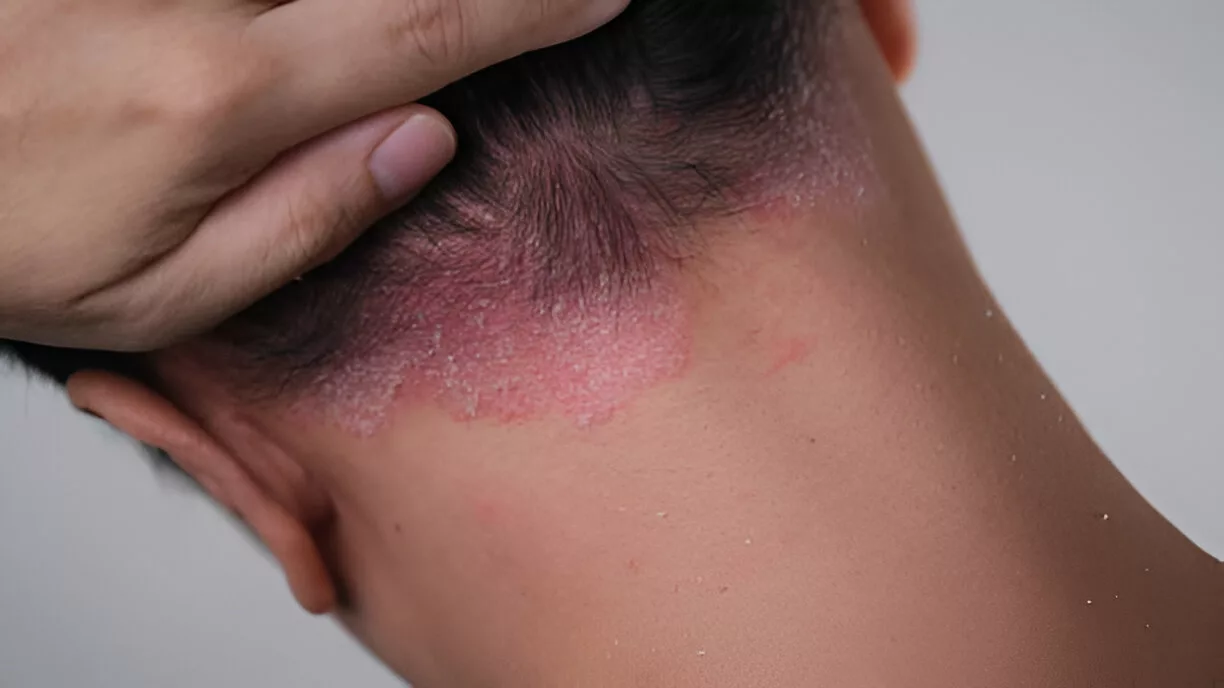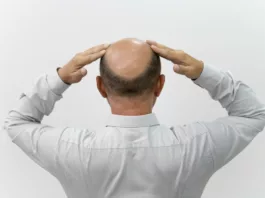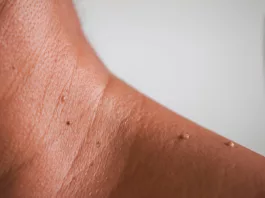Scalp psoriasis is a common form of psoriasis that presents with lesions specifically affecting the scalp. These lesions may occur in isolation or alongside psoriasis lesions elsewhere on the body. The condition typically features red, thickened, and sharply demarcated patches covered with silvery-white scales. These patches can involve small localized areas or extend across the entire scalp. Psoriasis itself is a chronic, immune-mediated inflammatory disease that primarily affects the skin and joints. It is estimated to affect 1 to 3% of the global population, and scalp involvement occurs in approximately 45 to 90% of these patients.1Wollina, U., et al., Scalp psoriasis: a promising natural treatment. Journal of biological regulators and homeostatic agents, 2016. 30(2 Suppl 3): p. 103-8.
Scalp psoriasis demands special attention because of its disproportionate impact on quality of life. The visible nature of the condition often leads to social stigma, embarrassment, and psychological stress, making it particularly burdensome. It is also considered more difficult to manage than psoriasis affecting other areas due to the presence of hair, which can interfere with the application and absorption of topical therapies. Treatment regimens range from simple to complex and are often tailored to patient preference, disease severity, and response to previous therapies.2Mosca, M., et al., Scalp psoriasis: a literature review of effective therapies and updated recommendations for practical management. Dermatology and therapy, 2021. 11(3): p. 769-797.
Causes & Effects of Scalp Psoriasis
Scalp psoriasis occurs when the immune system mistakenly targets healthy skin cells, causing the body to produce new skin cells much faster than normal. Typically, skin cells take weeks to mature and shed, but in psoriasis, this process takes only days, and the body fails to remove the excess cells. As a result, these extra cells accumulate on the scalp, forming thick, scaly patches.
You’re more likely to develop scalp psoriasis if you have a family history, but it can also occur in people without any known genetic link. It is not contagious—you cannot catch it through skin-to-skin contact.
Several factors may trigger or worsen scalp psoriasis:
- Alcohol
- Tobacco
- Stress
- Infection
- Dry or cold weather
- Skin injuries (Koebner phenomenon)
- Obesity
- Having other autoimmune disorders
- Certain medications (e.g., lithium, beta-blockers, hydroxychloroquine, prednisone)
Scalp psoriasis causes rough, thick, dry, scaly, and discolored patches or plaques, which can be itchy or painful. The condition can cause hair loss, and scratching can worsen the loss.
Symptoms of Scalp Psoriasis
Scalp psoriasis can present in various forms, ranging from mild scaling to thick, crusted plaques. In clinical settings, lesions typically affect the hairline, behind the ears (post-auricular), and the occipital region. Lesions may appear in isolated patches or diffusely, and some cases may present with only erythema or fine scaling (pityriasiform desquamation).3Wollina, U., et al., Scalp psoriasis: a promising natural treatment. Journal of biological regulators and homeostatic agents, 2016. 30(2 Suppl 3): p. 103-8.
Common symptoms include:
- Red, raised, and well-demarcated patches covered with silvery-white scales
- Itching (pruritus), often severe4Mosca, M., et al., Scalp psoriasis: a literature review of effective therapies and updated recommendations for practical management. Dermatology and therapy, 2021. 11(3): p. 769-797.
- Burning or stinging sensations
- Soreness or tenderness
- Dryness of the scalp
- Flakes resembling dandruff
- Pain or irritation in affected areas
- Cracking or fissures in the scalp
- Hair loss can impact self-image, and many patients experience psychological effects such as depression, anxiety, and low self-esteem
Diagnosis of Scalp Psoriasis
Your healthcare provider can usually diagnose scalp psoriasis based on a physical examination of your scalp. They will ask about your symptoms, their duration, and whether you have a family history of psoriasis. They may also inquire about recent changes in hair products, medications, or exposure to stressors that could have triggered a flare-up.
During the exam, your doctor will assess the location, size, shape, and number of lesions and may ask questions like:
- When did you first notice the symptoms?
- How itchy or painful are the lesions?
- Have you had psoriasis before?
- What treatments, if any, have you tried?
- Are you taking any medications or managing any other health conditions?
To rule out other skin conditions that can mimic scalp psoriasis, such as seborrheic dermatitis, eczema, or tinea capitis, your provider might order additional tests, including:
- Skin biopsy: A small sample of skin is taken and examined under a microscope to confirm the diagnosis.
- Blood tests: These help rule out other systemic causes of rash.
- Allergy tests: If an allergic reaction is suspected, your provider might suggest patch testing or skin prick tests.
Treatment & Management
There is currently no definitive cure for scalp psoriasis. However, various treatments can help manage symptoms and improve quality of life. These therapies include topical medications, systemic treatments, and phototherapy. Treatments may be applied directly to the scalp, taken orally, or injected, depending on disease severity. The severity of the condition can be measured through the psoriasis scalp severity index (PSSI). PSSI measures the following things:
- The extent of scalp involvement
- Severity of erythema
- Induration (thickness/infiltration)
- Desquamation (scaling)
PSSI scores range from 0 to 72, with higher scores indicating more severe disease. A score of 0 reflects the absence of psoriasis.5Ortonne, J.P., et al., Scalp psoriasis: European consensus on grading and treatment algorithm. 2009, Wiley Online Library.
First-Line Treatment for Mild to Moderate Disease (Topical Treatment):
Topical therapies are generally the first choice for mild to moderate disease:
Corticosteroids
These are the mainstay of scalp psoriasis treatment. Potent to super-potent corticosteroids like clobetasol and betamethasone are available in formulations such as shampoos, foams, gels, and lotions. They quickly relieve inflammation and itching. However, prolonged use can lead to side effects like skin thinning, so treatment is typically time-limited and followed by intermittent use.
Vitamin D Analogs
Agents like calcipotriol normalize skin cell turnover and are effective in long-term maintenance. They are commonly available as gels, ointments, or foams.
Combination Products
Combining a vitamin D analog with a corticosteroid enhances effectiveness and reduces side effects compared to corticosteroid monotherapy.
Keratolytics
Salicylic acid, urea, and lactic acid act as keratolytics and help in softening and removing the thick scales. Keratolytics improve the penetration of topical medications.
Coal Tar Products
Coal tar formulations (shampoos, foams, gels, soaps) help slow down skin cell growth and reduce scaling, itching, and inflammation.
Systemic & Advanced Therapies for Moderate to Severe Disease:
When topical treatments are ineffective or the disease is extensive, systemic therapy may be used:
Biologic Agents
These injectable drugs target specific parts of the immune system:
Tumor necrosis factor (TNF) alpha-blockers such as:
- Adalimumab6Thaci, D., et al., Adalimumab for the treatment of moderate to severe psoriasis: subanalysis of effects on scalp and nails in the BELIEVE study. Journal of the European Academy of Dermatology and Venereology, 2015. 29(2): p. 353-360.
- Infliximab7Noda, S., K. Mizuno, and M. Adachi, Treatment effect of adalimumab and infliximab in Japanese psoriasis patients: results in a single community‐based hospital. The Journal of Dermatology, 2012. 39(3): p. 265-268.
- Etanercept8Reich, K., et al., The efficacy and safety of apremilast, etanercept and placebo in patients with moderate‐to‐severe plaque psoriasis: 52‐week results from a phase IIIb, randomized, placebo‐controlled trial (LIBERATE). Journal of the european academy of dermatology and venereology, 2017. 31(3): p. 507-517.
- Certolizumab
Interleukin (IL)-17 Inhibitors such as:
- Brodalumab9Elewski, B., et al., Efficacy of brodalumab in the treatment of scalp and nail psoriasis: results from three phase 3 trials. Journal of Dermatological Treatment, 2022. 33(1): p. 261-265.
- Secukinumab
- Ixekizumab
IL-23 Inhibitors such as:
- Mirikizumab10Reich, K., et al., Efficacy and safety of mirikizumab (LY3074828) in the treatment of moderate‐to‐severe plaque psoriasis: results from a randomized phase II study. British Journal of Dermatology, 2019. 181(1): p. 88-95.
- Risankizumab11Papp, K.A., et al., Risankizumab versus ustekinumab for moderate-to-severe plaque psoriasis. New England Journal of Medicine, 2017. 376(16): p. 1551-1560.
- Guselkumab
PDE4 Inhibitors such as:
- Apremilast
IL-12/IL-23 Inhibitors such as:
- Ustekinumab
Traditional Systemic Medications (Oral)
Oral medicines are tablets or pills you can swallow with water. These include:
- Methotrexate
- Cyclosporine
- Acitretin
These drugs are usually reserved for moderate to severe cases or when biologics are not suitable.
Phototherapy
Phototherapy using narrowband UVB light (from full-body lamps or UV combs) can be effective, especially when topical or systemic therapies are insufficient or contraindicated.12Mosca, M., et al., Scalp psoriasis: a literature review of effective therapies and updated recommendations for practical management. Dermatology and therapy, 2021. 11(3): p. 769-797.
Self-Care Tips & Precautions
- Avoid rubbing, scrubbing, and scratching the scalp as they can worsen the condition.
- Use scale softeners and try to gently loosen the scales with a soft brush or fine-toothed comb before applying the medications.
- Try to apply medication directly to the scalp, not just to the hair.
- Use medicated shampoos and leave them on the scalp for five to ten minutes before rinsing.
- Stress reduction techniques and support groups can benefit the overall management of scalp psoriasis.
- Gentle washing, moisturizing, and avoiding harsh treatment can help maintain scalp health and reduce flare-ups.
Natural Remedies for Managing Scalp Psoriasis
Some natural products and home remedies might help in managing the condition. It is important to note that these remedies should always be utilized after discussing with a healthcare provider. These remedies include
- Olive oil helps moisturize dry skin and minimize itching and irritation.
- Coconut oil has anti-bacterial and anti-inflammatory properties, and it moisturizes the skin.
- Aloe vera keeps the skin hydrated. It treats irritation and itchiness. It is wound care gel, and you need to apply it to your plaques approximately two to three times a day.
Scalp Psoriasis Vs Dandruff
Both dandruff and scalp psoriasis are skin conditions that affect the scalp, while dandruff is an itchy white or yellow flakes on the scalp. The exact cause of dandruff is still not known.
| Feature | Scalp Psoriasis | Dandruff |
|---|---|---|
| Cause | Scalp, and sometimes extends to the forehead, back of ears, and neck | Overgrowth of Malassezia yeast and scalp irritation |
| Appearance | Thick, silvery-white scales on red, inflamed skin | White or yellowish oily flakes without much redness |
| Itching | Often severe | Mild to moderate |
| Chronicity | Chronic and long-lasting; may relapse and remit | Often temporary or recurrent but milder |
| Affected Areas | Often temporary or recurrent, but milder | Primarily scalp only |
| Skin Changes | May cause plaques, cracking, and bleeding in severe cases | No thick plaques or bleeding |
| Treatment | Topical corticosteroids, salicylic acid, coal tar, vitamin D analogs, biologics | Anti-dandruff shampoos containing zinc pyrithione, ketoconazole, selenium sulfide |
| Severity | Can be moderate to severe and affect quality of life | Usually mild and cosmetic |
| Prevention | Not preventable; manageable with medical treatment | May be controlled with regular scalp hygiene and anti-dandruff products |
Final Remarks
Scalp psoriasis can significantly impact a person’s quality of life and appearance. Although it cannot be prevented, timely diagnosis and treatment can help manage symptoms effectively. Consult a healthcare professional if you notice persistent scalp irritation, thick scales, or other unusual symptoms.
Refrences
- 1Wollina, U., et al., Scalp psoriasis: a promising natural treatment. Journal of biological regulators and homeostatic agents, 2016. 30(2 Suppl 3): p. 103-8.
- 2Mosca, M., et al., Scalp psoriasis: a literature review of effective therapies and updated recommendations for practical management. Dermatology and therapy, 2021. 11(3): p. 769-797.
- 3Wollina, U., et al., Scalp psoriasis: a promising natural treatment. Journal of biological regulators and homeostatic agents, 2016. 30(2 Suppl 3): p. 103-8.
- 4Mosca, M., et al., Scalp psoriasis: a literature review of effective therapies and updated recommendations for practical management. Dermatology and therapy, 2021. 11(3): p. 769-797.
- 5Ortonne, J.P., et al., Scalp psoriasis: European consensus on grading and treatment algorithm. 2009, Wiley Online Library.
- 6Thaci, D., et al., Adalimumab for the treatment of moderate to severe psoriasis: subanalysis of effects on scalp and nails in the BELIEVE study. Journal of the European Academy of Dermatology and Venereology, 2015. 29(2): p. 353-360.
- 7Noda, S., K. Mizuno, and M. Adachi, Treatment effect of adalimumab and infliximab in Japanese psoriasis patients: results in a single community‐based hospital. The Journal of Dermatology, 2012. 39(3): p. 265-268.
- 8Reich, K., et al., The efficacy and safety of apremilast, etanercept and placebo in patients with moderate‐to‐severe plaque psoriasis: 52‐week results from a phase IIIb, randomized, placebo‐controlled trial (LIBERATE). Journal of the european academy of dermatology and venereology, 2017. 31(3): p. 507-517.
- 9Elewski, B., et al., Efficacy of brodalumab in the treatment of scalp and nail psoriasis: results from three phase 3 trials. Journal of Dermatological Treatment, 2022. 33(1): p. 261-265.
- 10Reich, K., et al., Efficacy and safety of mirikizumab (LY3074828) in the treatment of moderate‐to‐severe plaque psoriasis: results from a randomized phase II study. British Journal of Dermatology, 2019. 181(1): p. 88-95.
- 11Papp, K.A., et al., Risankizumab versus ustekinumab for moderate-to-severe plaque psoriasis. New England Journal of Medicine, 2017. 376(16): p. 1551-1560.
- 12Mosca, M., et al., Scalp psoriasis: a literature review of effective therapies and updated recommendations for practical management. Dermatology and therapy, 2021. 11(3): p. 769-797.





